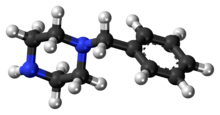
Back بنزيل بيبرازين Arabic بنزیل پپپرازین AZB Benzylpiperazin Czech 1-Benzylpiperazin German Benzilpiperazino Esperanto بنزیلپیپرازین Persian Bentsyylipiperatsiini Finnish Benzylpipérazine French Benzilpiperazin Croatian Benzilpiperazina Italian
 | |
 | |
| Clinical data | |
|---|---|
| Routes of administration | Oral, intravenous, insufflation |
| ATC code |
|
| Legal status | |
| Legal status |
|
| Pharmacokinetic data | |
| Bioavailability | Unknown |
| Metabolism | Hepatic |
| Elimination half-life | 5.5 Hours[4] |
| Excretion | Renal |
| Identifiers | |
| |
| CAS Number | |
| PubChem CID | |
| ChemSpider | |
| UNII | |
| KEGG | |
| ChEBI | |
| ChEMBL | |
| CompTox Dashboard (EPA) | |
| ECHA InfoCard | 100.018.567 |
| Chemical and physical data | |
| Formula | C11H16N2 |
| Molar mass | 176.263 g·mol−1 |
| 3D model (JSmol) | |
| |
| |
| | |
Benzylpiperazine (BZP) is a substance often used as a recreational drug and is known to have euphoriant and stimulant properties. Several studies conducted between 2000 and 2011 found that the effects of BZP are similar to amphetamine, although BZP's dosage is roughly 10 times higher by weight.[5][6]
Adverse effects have been reported following its use including acute psychosis, renal toxicity and seizures.[7] Deaths from piperazine derivatives are extremely rare, but there has been at least one death apparently due to BZP alone.[8] Its sale is banned in several countries, including Australia, Canada, New Zealand, the United States, the Republic of Ireland, the United Kingdom, Bulgaria, Romania and other parts of Europe.[9][10]
- ^ Anvisa (24 July 2023). "RDC Nº 804 - Listas de Substâncias Entorpecentes, Psicotrópicas, Precursoras e Outras sob Controle Especial" [Collegiate Board Resolution No. 804 - Lists of Narcotic, Psychotropic, Precursor, and Other Substances under Special Control] (in Brazilian Portuguese). Diário Oficial da União (published 25 July 2023). Archived from the original on 27 August 2023. Retrieved 27 August 2023.
- ^ "Benzylpiperazine [BZP], namely 1-benzylpiperazine and its salts, isomers and salts of isomers". Controlled Drugs and Substances Act: Schedule III. Justice Laws Website, Government of Canada. 14 January 2023.
- ^ "Amending Schedule III to the Controlled Drugs and Substances Act (BZP and TFMPP)". Canada Gazette. Retrieved 24 November 2012.
- ^ Antia U, Lee HS, Kydd RR, Tingle MD, Russell BR (April 2009). "Pharmacokinetics of 'party pill' drug N-benzylpiperazine (BZP) in healthy human participants". Forensic Science International. 186 (1–3): 63–67. doi:10.1016/j.forsciint.2009.01.015. PMID 19261399.
- ^ Johnstone AC, Lea RA, Brennan KA, Schenk S, Kennedy MA, Fitzmaurice PS (November 2007). "Benzylpiperazine: a drug of abuse?". Journal of Psychopharmacology. 21 (8): 888–894. doi:10.1177/0269881107077260. PMID 17606471. S2CID 27130853.
- ^ Update on 1-benzylpiperazine (BZP) party pills. 2013. Arch Toxicol. 87/6, 929-47. M.S. Monteiro, M.D.L. Bastos, P. Guedes De Pinho, M. Carvalho. doi: 10.1007/s00204-013-1057-x.
- ^ Schep LJ, Slaughter RJ, Vale JA, Beasley DM, Gee P (March 2011). "The clinical toxicology of the designer "party pills" benzylpiperazine and trifluoromethylphenylpiperazine". Clinical Toxicology. 49 (3): 131–141. doi:10.3109/15563650.2011.572076. PMID 21495881. S2CID 42491343.
- ^ Gee P, Schep LJ (2022). "Chapter 12: 1-Benzylpiperazine and other piperazine-based stimulants". In Dargan P, Wood D (eds.). Novel Psychoactive Substances (2nd ed.). Elsevier. pp. 301–332. doi:10.1016/b978-0-12-818788-3.00009-7. ISBN 978-0-12-818788-3. S2CID 239180001.
- ^ Topping A (18 June 2007). "Legal dance drug faces ban amid fears over side-effects". The Guardian. Retrieved 26 May 2008.
- ^ "Harney announces ban on stimulant BZP". The Irish Examiner. 18 June 2007. Archived from the original on 6 April 2009. Retrieved 28 December 2009.